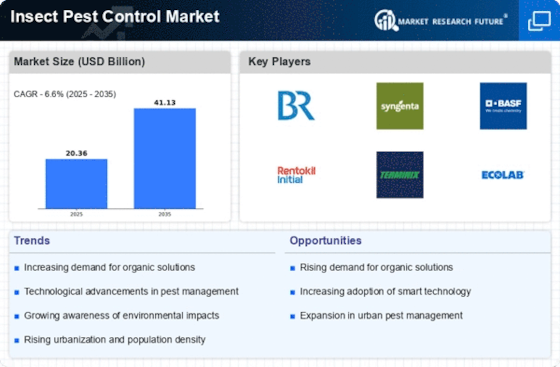Top Industry Leaders in the Insect Pest Control Market
 Insect pest control market outlook
Insect pest control market outlook
The competitive landscape of the insect pest control market is dynamic and evolving, driven by the increasing global awareness of the importance of pest management in agriculture, public health, and industrial settings. As the demand for sustainable and environmentally friendly solutions grows, companies are adopting innovative strategies to gain a competitive edge in this burgeoning market.
Key players in the insect pest control market include :
- FMC Corporation
- Bayer AG
- Syngenta
- China National Agrochemical Company Limited
- BASF SE
- Ecolab
- Rollins, Inc
- Curtis Gilmour
- ADAMA Agricultural Solutions
- Sumitomo Chemical Company Limited
- Renkotil Initial plc
Market Share Analysis:
Product Portfolio: The type of pest control solution offered – chemical, biological, physical, or integrated – significantly impacts market share. Chemical pesticides still hold the lion's share but concerns over resistance and environmental impact are pushing the needle towards greener alternatives.
Target Demographics: The market caters to both residential and commercial clients, each with distinct needs and budget considerations. Companies adept at tailoring services and pricing to these segments gain an edge.
Geographical Market: Regional regulations, pest profiles, and cultural preferences play a crucial role in shaping market dynamics. Players with strong regional understanding and localized offerings stand out.
New & Emerging Companies:
Tech-Savvy Disruptors: Startups like Terminix Service Now and PestRoutes are making waves with AI-powered pest control solutions. They utilize sensor-based monitoring, data analytics, and targeted pest control applications, offering customized and cost-effective options.
Specialized Solutions: Niche players like Beeline and Mosquito Joe are carving their path by focusing on specific pests like mosquitoes or bed bugs. Their in-depth expertise and targeted solutions cater to a growing demand for specialized pest control.
Industry News & Investment Trends:
Consolidation Wave: Mergers and acquisitions remain a prevalent strategy, with giants like Rentokil Initial acquiring smaller players to expand their service footprint and product offerings.
Green Revolution: Investments in research and development of biological and eco-friendly pest control solutions are on the rise, driven by regulatory pressures and consumer demand.
Digital Transformation: Adoption of automation tools, online booking platforms, and mobile apps is streamlining operations, enhancing customer experience, and driving operational efficiency.
Competitive Scenario:
The insect pest control market is a fascinating battleground, where established players jostle for dominance while nimble newcomers exploit niche opportunities. Innovation, environmental consciousness, and technological prowess are key differentiators. Players who adapt to evolving customer preferences, embrace eco-friendly solutions, and leverage technology for efficient service delivery will stand out in this buzzing ecosystem. As the market continues to grow, expect to see further consolidation, diversification of offerings, and an increased focus on sustainability, making the fight for market share as thrilling as the chase after the perfect pest-control solution.
Recent News
- Green Goliath Rises: Bayer, the German chemical giant, recently announced a $1 billion investment in biological pest control solutions. This aggressive move signals a major shift towards eco-friendly alternatives in the traditionally chemical-dominated market. Expect to see more research and development in biopesticides, natural repellents, and microbial control agents.
- Tech Takes the Lead: Terminix Service Now, a tech-savvy startup, is gaining traction with its AI-powered pest control solutions. Their sensor-based monitoring system detects pest activity in real-time, allowing for targeted and precise treatments, minimizing pesticide use and reducing costs. This trend towards data-driven pest control is expected to disrupt traditional service models.
- Niche Players Thrive: Beeline, a company specializing in mosquito control, has secured a $20 million funding round. This investment highlights the growing demand for specialized pest control solutions. Expect to see more niche players catering to specific pests like bed bugs, termites, and rodents, offering tailored solutions for maximum effectiveness.
- Regulatory Rumble: The European Union's recent ban on glyphosate, a widely used herbicide, has sent shockwaves through the industry. This move is expected to accelerate the adoption of organic and biological pest control methods in agriculture, opening up new opportunities for eco-friendly players.
- Consolidation Continues: The market is witnessing a wave of mergers and acquisitions, with large players like Rentokil Initial acquiring smaller regional companies. This consolidation trend aims to expand service footprints, diversify offerings, and gain market share. However, it also raises concerns about potential price hikes and reduced competition.
- Beyond the Buzz: These recent developments paint a picture of a dynamic and evolving market. Consumers are increasingly seeking environmentally friendly and technology-driven solutions, while regulatory changes and niche players are pushing the boundaries of traditional pest control methods. With continued innovation and investment, the insect pest control market is poised for exciting growth in the coming years.










